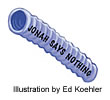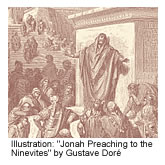by R. Reed Lessing
To say Jonah wasn’t keen on sharing his faith with the people of Nineveh is something of an understatement, but just as God called Jonah to bring His Word to the people of Nineveh, so also He calls us to share our faith today.

Jonah is such a surprise. On the outside it appears to be a narrative that we know. We think of it as a double act—“Jonah and the Whale,” like “Laurel and Hardy” or “Gilbert and Sullivan.” Unlike its slender prophetic neighbors, Obadiah and Micah, Jonah is a story most of us can’t remember not knowing. We’ve been acquainted with the book’s outline for as long as we can remember: chapter 1, “The Flight”; chapter 2, “The Fish”; chapter 3, “The Fast”; chapter 4, “The Fuss.”
Or we might recall the chapters this way: “See Jonah Perish,” “See Jonah Pray,” “See Jonah Preach,” “See Jonah Pout!” The book has inspired Moby Dick, Pinocchio, and a Veggie Tales cartoon. It is a prime candidate for a Sundayschool flannel-board lesson or a nice, safe bedtime story. Jonah appears to be an easily packaged narrative, effortless to unwrap, read, and then quickly set aside.
But a plain-looking narrative may contain a coiled spring or two. The Lord says to the prophet in Jonah 1:2, “Arise, go to Nineveh.”
Shocking indeed! In the eighth century B.C. Nineveh was a leading city in Assyria, and just the mention of “Assyria” would bring on almost any Israelite a nervous breakdown. Note below these blood-curdling words of the ninth-century B.C. Assyrian king Ashru-nasirpal II:
I stormed the mountain peaks and took them. In the midst of the mighty mountains I slaughtered them; with their blood I dyed the mountain red like wool. With the rest of them I darkened the gullies and precipices of the mountains. I carried off their spoil and their possessions. The heads of their warriors I cut off, and I formed them into a pillar over against their city; their young men and their maidens I burned in the fire. I built a pillar over against the city gates, and I flayed all the chief men who had revolted, and I covered the pillar with their skins; some I walled up within the pillar, some I impaled upon the pillar on stakes, and others I bound to stakes round about the pillar.
What is more, in the Old Testament Assyria is compared to a swarm of killer bees, a razor that shaves and slits, and a rod that maims and mauls (Is. 7:18, 20; 10:5). Assyrians can be seen striding through the Old Testament, hands on their hips, taunting Israelites with words like, “I will give you two thousand horses, if you are able to set riders on them” (Is. 36:8), and proclaiming that Israel is destined to “eat her own dung and drink her own urine” (Is. 36:12).
Dealing with Nineveh—a key city in Assyria—calls for military commandos, an air, naval, and nuclear assault. But a prophet? Come on!
What a jolt this was for Jonah! A mission trip to Nineveh would mean the end of his comfortable and predictable ministry in the court of Jeroboam ben Joash (2 Kings 14:25). The Lord calls Jonah to take off his training wheels and ride his bike down a steep mountain!
Today, for us, Nineveh is any group of people who are walking in the darkness of unbelief, living in the depth of brokenness, and dying with the despair of those who have no hope of heaven. Nineveh is any group of people who act and dress and look and talk in ways that are so different from us they are threatening to us. The church’s response to “go to Nineveh” is all too often like that of Jonah’s: Run!
 “Jonah ran away from the Lord and headed for Tarshish” (1:3). Another coiled spring leaps out! This is unprecedented in the Old Testament. No one ever completely ignores the call of God. Gideon says, “My clan is the weakest in Manasseh, and I am the least in my family” (Judges 6:15). Jeremiah protests, “I do not know how to speak; I am only a child” (Jer. 1:6). Isaiah insists, “I am a man of unclean lips, and I live among a people of unclean lips” (Is. 6:5). But Jonah says absolutely nothing! It’s as though he hangs a large “Do Not Disturb” sign outside his bedroom door. To compare Jonah with Moses we would have to envision Moses throwing water on the burning bush. Jonah must have made the 60-mile journey from his hometown in Gath-hepher to Joppa in record time.
“Jonah ran away from the Lord and headed for Tarshish” (1:3). Another coiled spring leaps out! This is unprecedented in the Old Testament. No one ever completely ignores the call of God. Gideon says, “My clan is the weakest in Manasseh, and I am the least in my family” (Judges 6:15). Jeremiah protests, “I do not know how to speak; I am only a child” (Jer. 1:6). Isaiah insists, “I am a man of unclean lips, and I live among a people of unclean lips” (Is. 6:5). But Jonah says absolutely nothing! It’s as though he hangs a large “Do Not Disturb” sign outside his bedroom door. To compare Jonah with Moses we would have to envision Moses throwing water on the burning bush. Jonah must have made the 60-mile journey from his hometown in Gath-hepher to Joppa in record time.
Once Jonah reaches Joppa and boards the ship, the surprises come like rhythmic electrical shocks. When everyone else is praying to save the swamping ship, Jonah is sound asleep (1:5). Asked by the sailors his land and occupation, the prophet, who had sought to escape God’s presence, chants a confession of faith in the Lord, “who has made the sea and the dry land” (1:9). Jonah hits the water and the sea calms instantly (1:15). Jonah prays a psalm (2:2–9) and the Lord sends him out the front, rather than the rear, end of the fish (2:10). Think about that!
Jonah arrives in Nineveh, mounts the first available soapbox, and proclaims the city’s impending doom (3:4). His sermon is a booming command that rattles the rafters of Nineveh, makes the king come down from his throne, and plunges the city into the most famous sackcloth-andashes conversion in ancient Near Eastern history (3:5–10). The king commands, “No food, no water—everyone cry out to God with gusto” (Jonah 3:8). Think of the racket unwatered and unfed animals and children can make! So the Lord’s anger cools down (3:10), but then Jonah’s anger heats up (4:1).
The prophet now proceeds to lecture God. It is as though he says, “Lord, You are too full of love for Your own good because it makes You come across as a wishywashy capricious oriental monarch. When a city deserves zapping—zap it!” The Lord then proceeds to heat things up further for Jonah, bringing on sun, worm, and wind (4:7–8). The prophet becomes hot over the loss of his plant—hot enough to die (4:9).
“Look here,” says the Lord, “you pity your plant. Shall I not pity people, and populations, and even their pets?” (Jonah 4:10–11). But let’s not be too hard on Jonah. Why, at least in Jonah 1:9 and 4:2 the prophet articulates a biblical theology of creation and redemption, just like us. In chapter 2 Jonah weaves together a masterful prayer from the Psalter, showing that he loves hymnody and liturgy, just like us. In Jonah 3:4 the prophet preaches, “Forty more days and Nineveh will be changed,” indicating that he knows the Lord is “slow to anger and abounding in steadfast love” (Jonah 4:2b; cf. Ex. 34:5–7). Jonah embraces the Gospel, just like us. And yet Jonah is deaf to the missional call of God, just like us!
Orthodox theology, biblically based worship, and the pure Gospel may become for us rote and routine, a chore and a bore and a snore. We can so easily articulate, pontificate, and repristinate, but childlike wonder and captivated hearts eager to witness that “God was in Christ reconciling the world to Himself” (2 Cor. 5:19) so often dry up like forgotten fruit in the back of the refrigerator. Smug prejudice, empty creedalism, and solidarity without concern for incorporating those on the outside kills the mission of the church. And this is Satan’s strategy. He wants us to have a reputation for being alive, but in reality be dead, even dead in our mission to the world (Rev. 3:1). And so we find ourselves simply giving lip service to evangelism, witness, and outreach. Most of us are comfortable with Jonah as a Sunday-school lesson. But as a life-changing call to repentance and mission? That simply takes our breath away.
So what does the Lord do with Jonah? He asks a question (Jonah 4:10–11). “Shall I have compassion upon the great city of Nineveh?” And the narrative ends! But wait! Does Jonah angrily stomp back to Joppa and board another ship bound for Tarshish? Or does he stick it out in Nineveh, embracing the Lord’s mercy for all people, as well as their animals? These questions assume the Lord is only addressing Jonah. He is not.
 Out leaps another spring! The author of Jonah is employing a literary device called “the rhetoric of entrapment” (see 2 Sam. 12:1–12; Is. 5:1–7; Matt. 21:33–46). This means that Jonah’s answer is intentionally left open-ended, leaving the completion of the prophet’s story in our hands and hearts. The narrator’s strategy is to withhold the prophet’s answer to the question. In this way he leaves room for us to provide our answer.
Out leaps another spring! The author of Jonah is employing a literary device called “the rhetoric of entrapment” (see 2 Sam. 12:1–12; Is. 5:1–7; Matt. 21:33–46). This means that Jonah’s answer is intentionally left open-ended, leaving the completion of the prophet’s story in our hands and hearts. The narrator’s strategy is to withhold the prophet’s answer to the question. In this way he leaves room for us to provide our answer.
The Lord is asking you, dear reader, right now, “Shall I have compassion upon the great city of Nineveh?” But your answer, just like mine, more often than not, goes something like this. “Lord, those people are so different! I’m just not comfortable talking to them. And besides, there are a lot of other folks who can do the job much better than I can!”
So what does the Lord do? In the fullness of time He sent the Perfect Missionary. His name is Jesus. And Jesus says in Matt. 12:41, “One greater than Jonah is here.” And the narrative begins again!
Talk about shock and awe! Compassion for “Ninevites” marked Christ’s ministry. He talked publicly with women (e.g., John 4:1–42, see especially v. 27), socialized with sinners (Luke 15:1–2), exorcized demons (Mark 5:1–20), healed the lame, and gave sight to the blind (Matt. 15:31). Matthew 9:36 describes our Lord with these words, “When He saw the crowds, He had compassion upon them because they were harassed and helpless, like sheep without a shepherd.” Compassion is a defining
characteristic of Jesus’ missionary heart (Matt. 15:32; Mark 1:41; Luke 15:20).
But the Savior’s most outlandish act of compassion was before the creation of the world, when He planned the birth of Judas, who would betray Him, designed iron for the nails that would pierce His hands and feet, and conceived of orchestrating events that would lead Pilate to Judea, Caiaphas to Jerusalem, and the crowds to repeatedly cry out, “Crucify Him, crucify Him!” This is what John means when he says “the Lamb of God was slain before the creation of the world” (Rev. 13:8b; see also Acts 2:23; 1 Peter 1:20).
Shall the Lord have compassion upon the great city of Nineveh? The answer Jonah gave is brought to final fulfillment in the answer given by Jesus Christ. He stated the final, definitive answer to Jonah 4:10–11 with His whole heart, and He wrote it in His own blood. Jesus said “yes” to compassion upon the great city of Nineveh, indeed for the entire world!
 And this means the Father has placed in each of us a baptismal gift. We are daily empowered by the Holy Spirit through faith to open and claim the Savior’s free gift of forgiveness and eternal life. But within the water and Word of Holy Baptism there is one more surprise. You and I are spring-loaded with the love of Jesus to leap out and go in compassion to one place—Nineveh!
And this means the Father has placed in each of us a baptismal gift. We are daily empowered by the Holy Spirit through faith to open and claim the Savior’s free gift of forgiveness and eternal life. But within the water and Word of Holy Baptism there is one more surprise. You and I are spring-loaded with the love of Jesus to leap out and go in compassion to one place—Nineveh!





